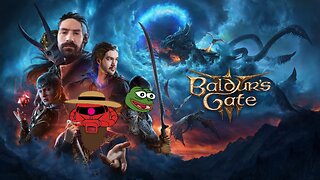Premium Only Content

'SS-GB' (1979) by Len Deighton
Len Deighton’s 'SS-GB' (1979) is one of the most audacious and accomplished works in his distinguished career—a gripping alternative history novel that imagines a chillingly plausible world in which Nazi Germany has successfully invaded and occupied Great Britain during the Second World War. Combining the meticulous detail of his Cold War spy thrillers with a bold speculative premise, Deighton constructs a Britain under fascist control that feels not only credible but alarmingly familiar. It is a novel that examines collaboration, resistance, and moral ambiguity under occupation—not in some faraway country, but in the heart of London.
Set in 1941, 'SS-GB' opens with the British government defeated, King George VI imprisoned in the Tower of London, and a Nazi administration firmly entrenched across the United Kingdom. Scotland Yard has been subsumed into the SS-led police apparatus, and Detective Superintendent Douglas Archer—Deighton’s central character—is working under the watchful eye of his new SS superior, Gruppenführer Fritz Kellermann. Archer is no ideologue; he is a competent, professional policeman trying to do his job under the weight of occupation. But as he investigates what appears to be a routine murder case, he is drawn into a complex web of espionage, resistance, and high-stakes deception involving both British and German actors—and ultimately, the fate of Britain itself.
Deighton’s portrayal of occupied Britain is masterful. The novel is saturated with authentic detail: blackout curtains and ration books, Blitzed buildings and overheard whispers, ordinary people forced into impossible choices. The familiar institutions of British life—the BBC, the monarchy, the police—are all shown in states of compromise or co-option. Deighton has always excelled at the bureaucratic side of espionage, and here he demonstrates how authoritarianism spreads not just through violence but through procedures, paperwork, and polite obedience. The banality of evil is a running theme: collaborators don’t necessarily believe in Nazism—they just want to keep their jobs.
Archer is a fascinating protagonist, not because he is a hero, but because he isn’t. He is intelligent, capable, and thoroughly compromised. His moral compass is not broken, but it is off-centre. He resents the Germans, but he also resents the British resistance for jeopardizing the fragile order in which he has learned to survive. His loyalties are not abstract but personal. What makes 'SS-GB' compelling is precisely this: there are no clean lines between good and evil. Everyone is working an angle, every ideal is shadowed by pragmatism, and survival often comes at the cost of self-respect.
The plot of the novel is intricate and tightly controlled, full of shifting alliances, coded messages, and strategic betrayals. Deighton balances the procedural and the political with astonishing precision. The murder Archer investigates becomes a hinge for larger geopolitical machinations, including a secret involving British nuclear research and the interests of both American and German intelligence. By keeping the narrative grounded in Archer’s personal investigation, Deighton allows the larger themes—fascism, resistance, sovereignty—to emerge organically rather than through grandiose speeches or historical exposition.
The character of Kellermann, Archer’s SS superior, deserves particular mention. He is urbane, intelligent, and deeply sinister, the kind of villain who smiles as he threatens. Their relationship is one of mutual distrust but also reluctant respect. It is in these small, carefully observed interactions that Deighton does some of his best work, showing how power operates through charm, ambiguity, and unspoken threats. The SS in 'SS-GB' are not caricatures, but chillingly professional administrators of occupation—a subtle but powerful critique of how easily systems can turn against the people they claim to serve.
Stylistically, Deighton’s prose is crisp and economical, with a clipped, report-like tone that mirrors the emotional restraint of his characters. He does not indulge in flourishes or sentimentality. The novel’s power comes from its understatement, its suggestion that horror does not require explosions or mass executions, only silence, fear, and complicity. The realism of 'SS-GB' is its greatest strength—it makes the impossible feel only a few missteps away from reality. It forces the reader to ask, “What would I have done?”
Thematically, the novel echoes the work of writers like Philip K. Dick (The Man in the High Castle) and Robert Harris (Fatherland), but it predates Harris and is more grounded in British sensibility than Dick’s metaphysical approach. 'SS-GB' is less interested in speculative counterfactuals than in moral psychology. It does not revel in the novelty of a Nazi Britain; it examines the slow corrosion of a society’s soul when the wrong side wins. In doing so, Deighton underscores how fragile democratic institutions are, and how easily legality can be weaponized against justice.
The ending of the novel is appropriately ambiguous. Victory and defeat are blurred. The resistance may win a battle, but the system remains. Archer, stripped of illusions, is not liberated but exhausted, a man who has glimpsed too much of the machinery behind the mask. There is no triumphant flourish, no clear lesson—just the lingering sense that history turns on the quiet decisions of men like Archer, who do what they must, and then go home.
'SS-GB' remains one of Deighton’s most significant achievements: a novel of great narrative intelligence, political insight, and moral gravity. It demonstrates his ability to move beyond the conventions of genre into territory that is at once speculative and deeply realistic. In an era still wrestling with the legacies of fascism, nationalism, and the abuse of state power, the questions it raises have not diminished in urgency. Indeed, they have only become more relevant. The greatest strength of 'SS-GB' is not that it shows us a world that might have been—it’s that it makes us wonder how close we already are.
-
 1:22:51
1:22:51
Glenn Greenwald
6 hours agoThe Irony of John Bolton's Classified Docs Indictment; Prominent Dems Now Stutter When Asked About AIPAC; Celebs in Saudi Arabia Controversy: What Does it Reveal? | SYSTEM UPDATE #532
52.6K30 -
 39:25
39:25
Donald Trump Jr.
4 hours agoFBI's Incredible Crime Crackdown, Plus my Message to ABC!! | TRIGGERED Ep.283
107K100 -
 LIVE
LIVE
BigTallRedneck
3 hours agoPGA 2K25 - REDNECK'S WAY OR THE HIGHWAY
54 watching -
 LIVE
LIVE
megimu32
2 hours agoON THE SUBJECT: MTV | From 24/7 Music to… Silence?
87 watching -
 LIVE
LIVE
Reolock
4 hours agoWoW Classic Hardcore | More Ultra? Maybe Mage?
33 watching -
 1:02:05
1:02:05
BonginoReport
5 hours agoMusic Stars Go Viral For Anti-ICE Rants - Nightly Scroll w/ Hayley Caronia (Ep.157)
57.9K38 -
 LIVE
LIVE
Amish Zaku
4 hours agoBaldur's Gate 3 - Four Player Co-op Act 3
20 watching -
 LIVE
LIVE
Barry Cunningham
3 hours agoKINDA BREAKING NEWS! JOHN BOLTON HAS BEEN INDICTED! WHO'S NEXT!
4,936 watching -
 LIVE
LIVE
a12cat34dog
2 hours agoTRIPPIN' INTO THE UNKNOWN :: The Evil Within 2 :: SPOOKTOBER CONTINUES {18+}
131 watching -
 LIVE
LIVE
OhHiMark1776
5 hours ago🟠 10-16-25 ||||| Act 3 Continue ||||| Baldur's Gate 3 (2023)
79 watching